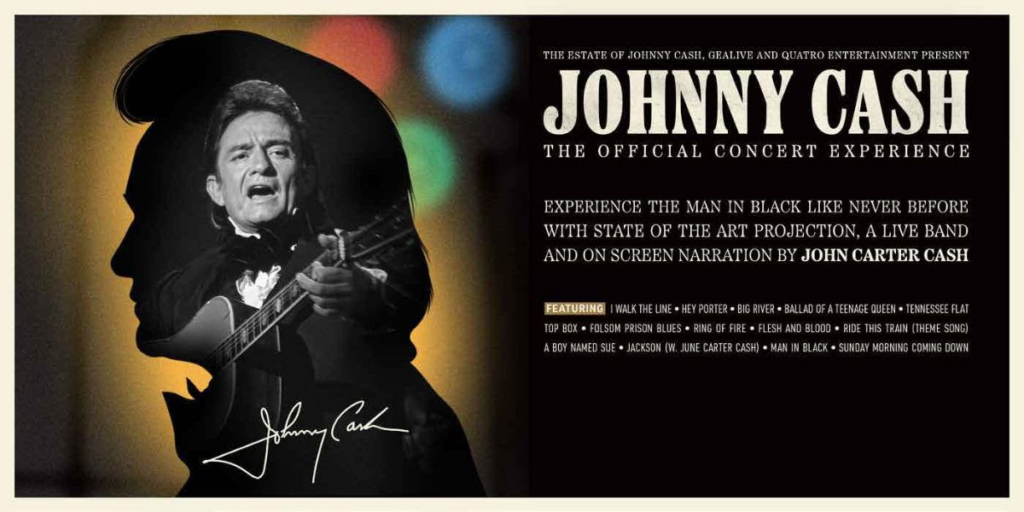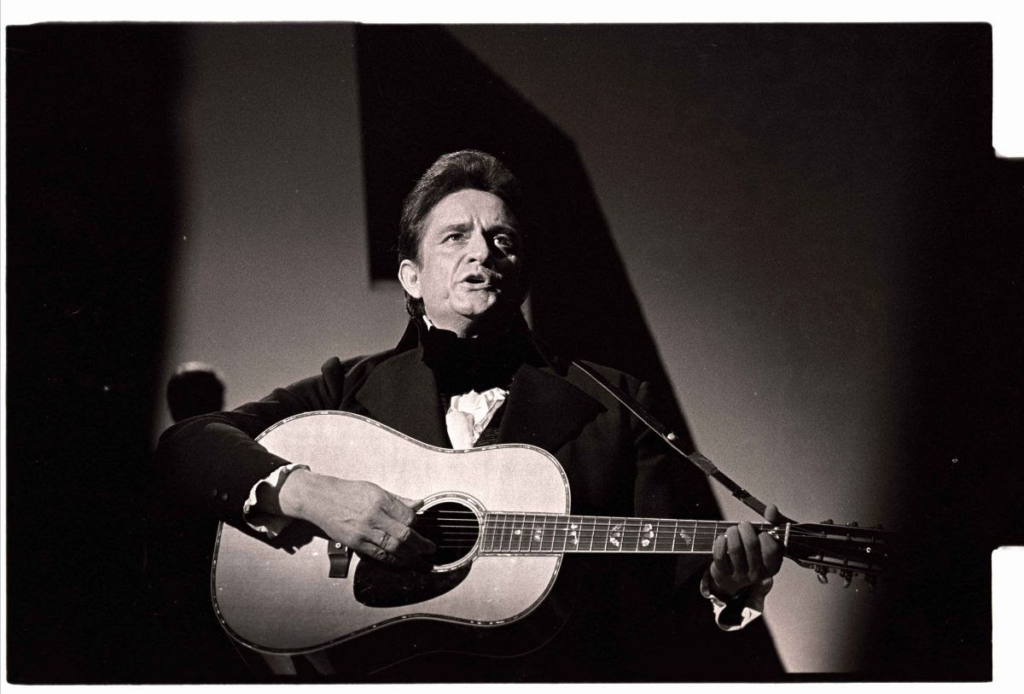“Johnny Cash: The Official Concert Experience” will launch from the Walton Arts Center in Fayetteville with shows on Oct. 14 and 15. Attendees will be the first to experience the new production before it hits the road for a national tour.

Producers are currently building the show, taking it from concept and laptop to the stage. Technical elements, including lighting and sound, will be finalized during two weeks of rehearsals prior to the two Fayetteville performances and the start of the national tour.
“It’s all coming together here,” Jennifer Ross, WAC vice president of programming, said.
Ralph Schmidtke, a co-producer for the show, said tech rehearsals and a launch require the availability of a full-scale theater and hotel rooms. Plus, costs associated with rehearsing in the area are taken into consideration. Fayetteville has everything needed.
Additionally, the Cash connection to Arkansas makes the state a natural place to launch the national tour, Schmidtke said. After all, the Man in Black was born and raised in The Natural State. He was born in Kingsland with his family moving to Dyess when he was 3.
Throughout his life, Cash was more than an influential musician. He represented the American dream of a small-town boy rising to fame, a rebel with a conscience, a flawed man of faith, and a voice for social justice. His actions and song lyrics exuded these elements and his music continues to inspire musicians today.
“Cash tracks are so honestly written. The lyrics stand up tall,” Schmidtke said.

To highlight Cash’s music, the show will be a concert experience with television footage of Cash married to a live band. The audience will hear stories about people Cash met along the way whose causes he championed with on-screen narration by Cash’s only son, John Carter Cash. Songs, stories and video of Cash from episodes of “The Johnny Cash TV Show” will be projected on a large screen above the stage.
“It’s a whole new approach to doing a tribute to the man that wrote these songs,” Schmidtke said. “It’s going to be a very live experience.”
On guitar and vocals will be Eric Hofmanis, who as a teenager came to love Cash in part because he drove a 70s car that had an eight-track tape player. The eight tracks he could get were mostly Elvis, Dolly Parton and Johnny Cash. Hofmanis describes the show as beyond respectful and true to Cash’s style. The video of Cash used for this show provides the storyteller part of the music, Hofmanis explained. “You get the man himself and then the live band. You’ll be immersed.”
Ross described the show as a celebration of Cash’s work. “It’s not dress up and be Johnny,” Ross said. “It’s really about the legacy and the music he left. It’s a celebration of his work.”
Jack Romano, a guitarist and vocalist on the tour, said “I’ve been listening to Johnny Cash since I was 5 years old.” Cash’s sound had a huge influence on Romano, who visited Cash’s boyhood home a few years ago.
The Historic Dyess Colony: Johnny Cash Boyhood Home not only preserves Cash’s boyhood home but also the Dyess Colony, an agricultural resettlement colony carved out of snake-infested swampland in Mississippi County in the 1930s by President Franklin Roosevelt’s administration.
Dyess Colony was an unprecedented government social experiment as part of the New Deal to give nearly 500 down-on-their-luck farmers a chance for a new start in life. With no money down, the Cash family was given 20 acres of fertile bottomland and a five-room house in which to live. Now owned by Arkansas State University, the house has been restored, along with several of the historic federal buildings.
The Dyess Colony Visitors Center includes a gift shop, orientation video and exhibits. The Dyess Colony Administration Building next door houses exhibits related to the establishment of the colony, lifestyles of typical colonists, and the impact that growing up in Dyess had on Johnny Cash and his music. From there, visitors are shuttled to the Johnny Cash Boyhood Home, less than two miles from the Colony Center. It is furnished as it appeared when the Cash family lived there, based on the memories of Johnny’s two youngest siblings who assisted in the restoration.
The Historic Dyess Colony: Johnny Cash Boyhood Home, a building in the Colony Circle and the gravel road leading to the Cash home were settings for the movie, Walk the Line.
“It has that 1930s New Deal architecture,” Romano said. Romano described his visit as a tactile experience. Standing on the land of Cash’s boyhood home and thinking about the muddy cotton field Cash worked in and the lyrics to Cash’s song “Five Feet High and Rising” about a flood his family endured give the songs a deeper meaning, he explained.
Romano and Hofmanis said that it’s an honor and privilege to be in the show, which has been approved by the Johnny Cash estate.
The shows take place at 8 p.m. on Oct. 14 and at 2 p.m. on Oct. 15. Regular tickets are $35 to $69 and can be purchased in-person at the Walton Arts Center Box Office weekdays 10 a.m. until 2 p.m., by calling 479-443-5600 weekdays 10 a.m. until 5 p.m., or by visiting waltonartscenter.org.
For those interested in other tributes to Cash, an 8-foot-tall bronze statue placed in the U.S. Capitol Building in Washington, D.C., will immortalize the life and legacy of country music icon Johnny Cash. Little Rock artist, Kevin Kresse created the 1,200-pound bronze statue and chose to highlight Cash in his early ‘70s era, which many people consider to be his golden years.
Arkansas Tourism
Arkansas Tourism, a division of the Arkansas Department of Parks, Heritage and Tourism, strives to expand the economic impact of travel and tourism in the state and enhance the quality of life for all Arkansans. The division manages 14 Arkansas Welcome Centers and employs more than 60 staff members across The Natural State. For more information, visit www.arkansas.com.
Arkansas Department of Parks, Heritage and Tourism
The Arkansas Department of Parks, Heritage and Tourism protects and promotes our state’s natural, cultural and historic assets, contributing to a thriving economy and high quality of life. It is made up of three divisions: Arkansas State Parks, Arkansas Heritage and Arkansas Tourism.

